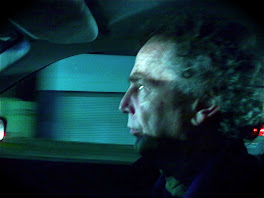Monday, April 04, 2005
dérive
In the previous post I probably should have written 'psychogeography' instead of 'social geography'. Which term comes out of Situationist practice with a provenance going back to the Surrealists, especially Breton's 'Nadja' and Aragon's 'Paris Peasant'. Current practitioners include Iain Sinclair with his exploratory journeys about London and the wild texts that document them. Probably John Birmingham's 'Leviathan,' a biography of Sydney which I still haven't read yet, is an example of the genre too. The dérive ('drift') as I understand it is a random walk in which you notice and interrogate everything you come across, consciously tracking your way through a forest of signs. Every night driving is a kind of inadvertent dérive (d'rive?) during which your unstructured bounce around the city and suburbs is at once both utterly meaningless and deeply meaningful ... trouble is, there's never enough time to reflect upon those signs you do manage to see, as opposed to merely encountering. I remember how I used to make a point of recalling in detail each night's peregrination at the end of a shift, but I'm too distracted at the moment to do that, so I just bring home those bits and pieces that stay with me, for whatever reason. So much of the city has altered in my time away from driving that I'm constantly finding myself at dead ends, in blocked off streets, taking turns I can't take or else driving along roads I don't want to be on. Other times, when I'm vacant, I'll visit parts of the city I love to see how they're getting on; it's surprising how often these random quests do result in fares. You find these dark solitary figures down dark solitary streets who want to go back to the bright lights. But it can go the other way too. I took a small risk yesterday, doing a U turn across traffic lights to pick up a couple of blokes in Bondi, one of whom said, in a thick, maybe Scottish accent, 'Pyrmont'. So off we went crawling through the atrocious after-football traffic all the way across town - third time in a row for me. I thought they seemed rather sanguine about the way the fare on the meter was climbing and I also wondered what they were muttering to each other in their unbreakable accent code which was hard even to hear with them both in the back seat and both fairly well shickered too. Anyway, Pyrmont ... I used to know it intimately and in fact in my last book, 'Chronicle of the Unsung', I practised a bit of psychogeography upon its then mostly derelict streets ... before I'd ever heard the term. It's unrecognisable now, casinos, hotels, TV studios and apartment blocks have replaced the vacant lots, crumbling industrial sites, disused churches, grimy pubs and marginal squats. Jones Road used to lead to the quarry where much of the stone for Sydney's grand Regency and Victorian buildings was cut but now, when I finally found it again, it's a street of brand new apartment buildings with a leafy park and a sandstone massif at the end. These guys didn't look like they lived in this kind of place and nor did they. As I pulled up and switched on the internal light they each popped their respective doors and took off into the greenery, skinny arms pumping. Shit! Thirty bucks just ran away, I thought. The bastards. In the instant I realised they'd not only planned it but must have tried it before. It was a perfect spot to do a runner. I didn't follow them - that'd be asking for trouble. I just turned around and drove back to the corner, where four young English women were waiting with a quite incredible amount of luggage to go to the Goldsbrough building ... which used to be the largest woolstore in the southern hemisphere, owned by the wonderfully named Elder Smith Goldsbrough Mort but is now another luxe apartment building. So I didn't make the rent last night. I was thirty dollars short.
